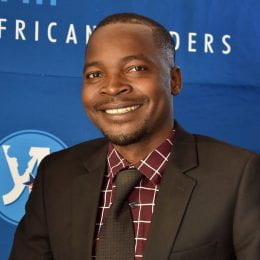Continuing the Leadership in Democracy blog series, Mandela Washington Fellowship Alumnus from the Staley School of Leadership Studies’ 2019 Leadership in Civic Engagement Institute, Robson Chere, National General Secretary of the Amalgamated Rural Teachers Union of Zimbabwe (ARTUZ), shares his opinion on how the current COVID-19 context and government decisions impact educational opportunity in his home country of Zimbabwe.
He asks us to consider the following questions:
- What role does the state have in recognizing educational inequity?
- How do educators advocate for more equitable learning?
- How can the state recognize power vested in the people?
- What does community change include when government officials are acting outside their formal authority prescribed by law?
The state of the education sector in Zimbabwe has for the past two decades been under a series of direct attacks from the governing authorities in Zimbabwe and this, in retrospect, emboldened my resolve in the fight against the injustices and inequalities that have now been part of the social fabric. I completed the Leadership in Civic Engagement Institute, part of the 2018 U.S. Department of State’s Mandela Washington Fellowship, at the the Staley School Of Leadership Studies at Kansas State University.
During my time at K-State, I gained a new scope and view on issues that surround education and in particular the idea behind advocating for justice and equal access to education to all. This cuts beyond the borders of class, race and gender. The visit to the Brown v. Board of Education National Historic Site in Topeka provided me a fresh perspective on how inequality is cancerous and how I could advocate for universal equality in my own context of Zimbabwe.
When a government operates outside the parameters of the law and does not fulfill its mandate of providing quality education to all, as citizens it is within our rights to organise ourselves into resistance towards eradication of all levels of injustice. Civic education and mass enlightenment are my key focal points through the advocacy work l do with my Union ARTUZ.
Education in Zimbabwe is under siege especially during a time when COVID-19 is wreaking-havoc. The state basically decided to force public examinations to go ahead despite the fact that students in public schools missed eight months of learning due to not being unable to access online lessons whilst those in private schools never missed a day of learning because of their elite privilege in accessing online lessons.
The government chose to ignore the pleas and advice of the public and education professionals in this regard and now they have criminalized trade unionism as evidenced by their clampdown on all dissenting voices. The teaching profession has lost value as the wage structure is evidence enough with teachers earning less than $50 (U.S.) a month. Now they are brewing a slow genocide in schools by seeking to open schools without even providing basic Personal Protective Equipment to teachers and learners.
I advocate for change through my role as the National Secretary General of the Amalgamated Rural Teachers Union of Zimbabwe. I wrote a more in-depth perspective on the issues confronting learners in Zimbabwe to help elevate.
In times of turmoil, change is of the essence and necessity, this change comes in many shapes but my strategy entails the concept of satyagraha (non-violent resistance to evil). This concept is embodied by democratic ideals and principles that speak to emancipation of the oppressed through advocacy, social consciousness of the oppressed and a powerful message of peace and hope through seeking change through society. Violence has always been a global problem and Zimbabwe is no exception, a violent society is a toxic society hence the need to uproot violence through intellectual thought leadership that is driven by the desire of a nonviolent approach.
The Mandela Washington Fellowship is a program of the U.S. Department of State with funding provided by the U.S. Government and administered by IREX. Kansas State University is a sub-grantee of IREX and is implementing a Leadership Institute as a part of the Fellowship. For more information about the Mandela Washington Fellowship, please visit the Fellowship’s website at www.mandelawashingtonfellowship.org.
More about Robson Chere
Robson Chere is the National Secretary General of Amalgamated Rural Teachers Union of Zimbabwe, a former Student Representative Council President of Hillside Teachers College (2009), Zimbabwe National Student Union General Councilour (2009), and Student Christian Movement of Zimbabwe Bulawayo Regional Chairperson (2007-08). He also attended the International Labour Research and Information Group Globalisation School in Johannesburg, South Africa (2018). Chere was an Arcturus Primary School Development Association Chairperson (2018), Basic Education Assistance Module Committee Chairperson for Arcturus High and Primary School Zimbabwe (2017), and a multi award-winning science teacher and soccer coach at Arcturus High School Zimbabwe. He is the current Citizens Cabinet Minister of Education with the Zimbabwean citizens coalition called Citizens Manifesto.
